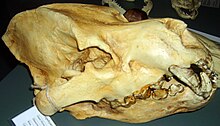Extinct family of carnivores
PercrocutidaeTemporal range: Middle Miocene to Late Pliocene
Dinocrocuta gigantea skull cast, Zoological Museum in Copenhagen
Scientific classification
Kingdom:
Animalia
Phylum:
Chordata
Class:
Mammalia
Order:
Carnivora
Suborder:
Feliformia
Family:
† Percrocutidae Werdelin & Solounias, 1991
Genera
Percrocutidae is an extinct family of hyena -like feliform carnivores endemic to Asia , Africa , and Southern Europe from the Middle Miocene through the Pliocene , existing for about 8 million years[1]
The first percrocutids are known from the middle Miocene of Europe and western Asia and belonged to the genus Percrocuta Percrocuta already had large premolars , but did not carry such a massive bite as the later form Dinocrocuta [2] Hyaenidae . Today, most scientists consider the Percrocutidae to be a distinct family - although usually as sister-taxa/immediate outgroup to Hyaenidae.[3] Stenoplesictidae into the superfamily .
Taxonomy [ ] Classification [ ]
Family † Percrocutidae
Family
Image
Genus
Species
†Percrocutidae
†Dinocrocuta (Schmidt-Kittler, 1975)
† D. algeriensis †D. gigantea
†D. salonicae
†D. senyureki
†Percrocuta (Kretzoi, 1938)
†P. abessalomi
†P. carnifex
†P. grandis
†P. leakeyi
†P. miocenica
†P. tobieni
†P. tungurensis
The list follows McKenna and Bell's Classification of Mammals for prehistoric genera (1997).[4]
References [ ]
^ Paleobiology Database: Percrocutidae basic information ^ Alan Turner & Mauricio Antón: Evolving Eden. An Illustrated Guide to the Evolution of the African Large-Mammal Fauna . Columbia University Press, New York, 2004. ISBN 0-231-11944-5
^ Borja Figueirido, Zhijie JACK Tseng, Alberto Martín-Serra, Skull Shape Evolution In Durophagous Carnivorans , Evolution 67(7):1975-93 · July 2013
DOI: 10.1111/evo.12059 · Source: PubMed
^ Malcolm C. McKenna, Susan K. Bell: ISBN 0-231-11013-8
Jordi Agustí: Mammoths, Sabertooths and Hominids 65 Million Years of Mammalian Evolution in Europe , Columbia University Press, 2002. LCCN 2001-42251 ISBN 0-231-11640-3
Extant Carnivora species
Kingdom: Animalia
Phylum: Chordata
Class: Mammalia
Infraclass: Eutheria
Superorder: Laurasiatheria
Nandiniidae
Nandinia
African palm civet (N. binotata )
Herpestidae (Mongooses)
Hyaenidae (Hyenas)
Felidae Large family listed below
Viverridae Large family listed below
Eupleridae Small family listed below
Family Felidae
Felinae
Acinonyx Caracal Catopuma
Bay cat (C. badia ) Asian golden cat (C. temminckii ) Felis Herpailurus
Jaguarundi (H. yagouaroundi ) Leopardus Leptailurus Lynx
Canada lynx (L. canadensis ) Eurasian lynx (L. lynx ) Iberian lynx (L. pardinus ) Bobcat (L. rufus ) Otocolobus Pardofelis
Marbled cat (P. marmorata ) Prionailurus Puma
Pantherinae
Panthera
Lion (P. leo ) Jaguar (P. onca ) Leopard (P. pardus ) Tiger (P. tigris ) Snow leopard (P. uncia ) Neofelis
Sunda clouded leopard (N. diardi ) Clouded leopard (N. nebulosa )
Paradoxurinae
Arctictis Arctogalidia
Small-toothed palm civet (A. trivirgata ) Macrogalidia
Sulawesi palm civet (M. musschenbroekii ) Paguma
Masked palm civet (P. larvata ) Paradoxurus
Hemigalinae
Chrotogale Cynogale
Otter civet (C. bennettii ) Diplogale Hemigalus
Banded palm civet (H. derbyanus )
Prionodontinae (Asiatic linsangs)
Viverrinae
Civettictis
African civet (C. civetta ) Genetta (Genets) Poiana Viverra Viverricula
Small Indian civet (V. indica )
Suborder Caniformia (cont. below)
Ursidae (Bears)
Ailuropoda
Giant panda (A. melanoleuca ) Helarctos Melursus Tremarctos
Spectacled bear (T. ornatus ) Ursus
American black bear (U. americanus ) Brown bear (U. arctos ) Polar bear (U. maritimus ) Asian black bear (U. thibetanus )
Mephitidae (Skunks )
Conepatus (Hog-nosed Mephitis
Hooded skunk (M. macroura ) Striped skunk (M. mephitis ) Mydaus Spilogale (Spotted skunks)
Procyonidae (Raccoons, coatis, olingos)
Ailuridae
Ailurus
Himlayan red panda (A. fulgens ) Chinese red panda (A. styani )
Suborder Caniformia (cont. above)
Otariidae (Eared seals) (includes fur seals sea lions ) (Pinniped inclusive)
Arctocephalus Callorhinus
Northern fur seal (C. ursinus ) Eumetopias
Steller sea lion (E. jubatus ) Neophoca Otaria
South American sea lion (O. flavescens ) Phocarctos
New Zealand sea lion (P. hookeri ) Zalophus
Odobenidae (Pinniped inclusive)
Phocidae (Earless seals) (Pinniped inclusive)
Cystophora Erignathus
Bearded seal (E. barbatus ) Halichoerus Histriophoca
Ribbon seal (H. fasciata ) Hydrurga
Leopard seal (H. leptonyx ) Leptonychotes Lobodon
Crabeater seal (L. carcinophagus ) Mirounga (Elephant seals)
Northern elephant seal (M. angustirostris ) Southern elephant seal (M. leonina ) Monachus
Mediterranean monk seal (M. monachus ) Neomonachus Ommatophoca Pagophilus Phoca
Spotted seal (P. largha ) Harbor seal (P. vitulina ) Pusa
Canidae Large family listed below
Mustelidae Large family listed below
Family Canidae (includes dogs )
Family Mustelidae
Helictidinae (Ferret-badgers)
Guloninae (Martens and wolverines)
Ictonychinae (African polecats and grisons)
Lutrinae (Otters)
Melinae (Eurasian badgers)
Mellivorinae
Mellivora
Honey badger (M. capensis )
Mustelinae (Weasels and minks)
Mustela (Weasels and ferrets )
Mountain weasel (M. altaica ) Stoat/Beringian ermine (M. erminea ) Steppe polecat (M. eversmannii ) Ferret (M. furo ) Haida ermine (M. haidarum ) Japanese weasel (M. itatsi ) Yellow-bellied weasel (M. kathiah ) European mink (M. lutreola ) Indonesian mountain weasel (M. lutreolina ) Black-footed ferret (M. nigripes ) Least weasel (M. nivalis ) Malayan weasel (M. nudipes ) European polecat (M. putorius ) American ermine (M. richardsonii ) Siberian weasel (M. sibirica ) Back-striped weasel (M. strigidorsa ) Neogale
Taxidiinae
Taxidea
American badger (T. taxus )

